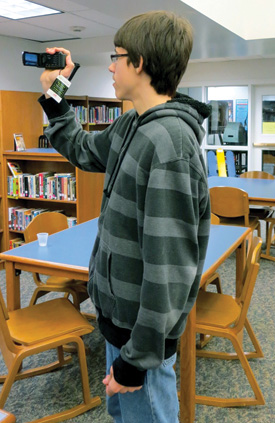Sara Kelly Johns knows the best way to teach her students about digital citizenship—give them cameras to make their own videos.
“By the end of the year, when they have something they’ve worked hard at—their own creation—they won’t want them to be pirated,” says the school librarian at Lake Placid (NY) Middle/High School (LPMHS), and author of the SLJ blog “Make Some Noise!” “That’s the most direct way of teaching digital citizenship.”

In Lake Placid, students learn about copyright principles as they gain video production skills
Despite the recent pullback of support by federal legislators, which has effectively shelved the antipiracy bills PIPA (Protect Intellectual Property Act) and SOPA (Stop Online Piracy Act), another proposal promises to keep the issues of digital piracy, censorship, and intellectual property front and center.
An international treaty to enforce intellectual property rights, the Anti-Counterfeiting Trade Agreement (ACTA) would allow Internet service providers to shut off customers who persist in illegally downloading copyrighted material. The U.S., Australia, Japan, and many European Union member states have signed the agreement. Critics say it poses a greater threat to the Internet and constitutional rights than SOPA and PIPA.
School librarians are taking these issues head on, schooling students on the nuances of copyright, piracy, and the importance of good citizenship, even in cyberspace. That can be difficult when kids get conflicting messages.
“Their parents may be buying illegal movies at the flea market, and so they don’t see it as a problem,” says Tamara Cox, a school librarian at Palmetto Middle School in Williamston, SC. “They see musicians and actors as rich and think, ‘I’m not hurting them.’”
Cox simply explains that a piece of music, an image, or an online movie is someone else’s property, just like a pencil on another student’s desk. While they can’t hold a digital file in their hands, it’s still intellectual property, and there’s an owner.
These lessons can be learned even by the youngest of students. Johns recalls hearing a story about an elementary school librarian who used baking as a way to illustrate copyright to kindergartners. The students were proud of the cookies they’d made and didn’t want anyone to claim they were from a store.
“The librarian set up a lesson on making and taking credit for the cookies, as opposed to taking credit for something made by Oreo,” she says.
From cookies, it’s a short leap to clip art and copyright. Today, students turn to the Internet to not only source research for papers, but to find content such as images and video to link or incorporate into portfolios, Animoto clips, blogs, and wikis. School librarians must then teach them how to ethically use these online materials, and how to cite properly. The biggest hurdle, however, is not telling them what to do—it’s making the lesson contextual, so students understand and absorb these ideas as they continue along their educational path.
“I talk about the positive effect legally sharing content has on our collective knowledge, and then I teach kids how to search for works licensed under Creative Commons. Then I show them how to license their own work,” says Jennifer LaGarde, a school librarian at Myrtle Grove Middle School in Wilmington, NC, by email. “If they see themselves as contributing to something big and important, not only do these choices become their default position but they will also seek out others who have chosen to share as well.”


